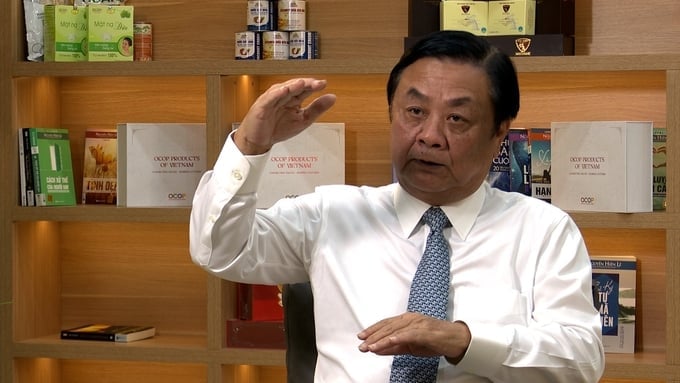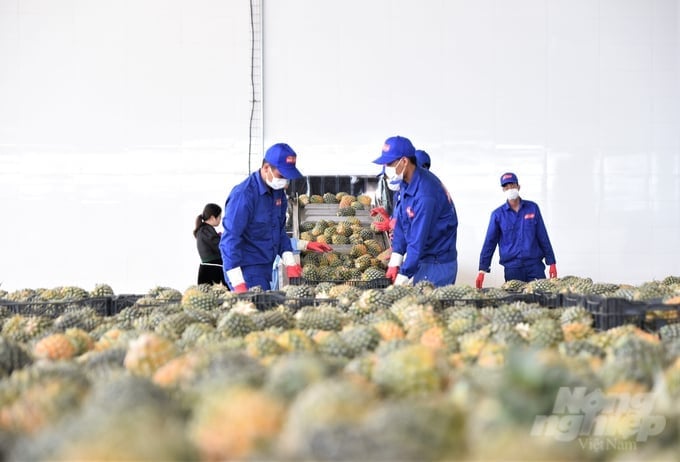May 18, 2025 | 20:03 GMT +7
May 18, 2025 | 20:03 GMT +7
Hotline: 0913.378.918
May 18, 2025 | 20:03 GMT +7
Hotline: 0913.378.918
Mr. Minister, why is the concept of knowledge-based farming considered a mandatory requirement in the current context?
Our traditional agriculture is experience-based, passed down from generation to generation. We have not viewed agriculture as a profession. According to tradition, we typicall consider experience-based activities as a profession. However, by definition, a profession should involve knowledge, training, and education.
Experience can be developed at a relatively slow pace, whereas knowledge is a graph that increases vertically. To make agriculture progress faster, further, and adapt to the trends in the agricultural sector within the context of a knowledge-based economy, there is no other way but to promote knowledge among farmers because farmers are the primary decision-makers in the agricultural value chain.

Mr. Le Minh Hoan, Minister of Agriculture and Rural Development, stated: "Promoting knowledge among farmers to align with a knowledge-based agriculture". Photo: Nhat Quang.
Farmers are responsible for sowing rice seeds in the fields, bringing livestock to their pens, and raising fish in ponds. As a result, ensuring professionalism and standardization from the beginning of the value chain is a prerequisite for the remainder of the supply chain, which consists of harvesting, post-harvest, processing, and packaging. If the input costs are high, the costs will grow exponentially along the value chain. Conversely, if the input costs are low, the costs will be low along the supply chain. Similarly, if the input quality is high, the quality of the entire agricultural product chain will be high.
Modern competition is based on costs and quality. For example, if we produce a type of mango with high costs, poor quality, we cannot compete with mango-exporting countries that have lower costs, lower prices, higher quality, and established market credibility. Consequently, if we can change the inputs, we can change the sector, gain a competitive advantage, and improve upon it.
According to many agricultural resolutions and reports from the central government to local levels, it is clear that our competitiveness level is low and full of risks. Consequently, farmers must be placed at the forefront of the value chain.
The knowledge empowerment of farmers towards professional farmers is a directive for the farmers themselves as well as the entire supply chain.
According to a foreign agricultural extension study, if you want to change a farm, you must first change the farmer because they are directly responsible for the farm's operation. In the past, we focused on individual branches and professions without paying attention to the farms. They are the tens of millions of farmer households. Accordingly, we must learn how many of them produce based on experience, and how many of them can access knowledge and technology trends to increase the scientific and technological content of their agricultural products. That is a knowledge-based economy.
The knowledge empowerment of farmers will help the them align with an agricultural landscape driven by knowledge. Additionally, this knowledge will yield surplus value, confer competitive advantages, and enable farmers to adopt a broader perspective beyond the confines of their own production areas. This perspective allows them to understand the evolving global landscape, the changing needs of the world, and their role as producers.
Knowledge empowerment also encompasses the manner in which a product is created. Modern consumers are not interested solely in the final product, be it rice, mangoes, or fish. Rather, there is a growing concern regarding the means by which these products are produced, their environmental impact, influence on climate change, effects on public health, sustainability, and soil degradation.
In the present day, consumers no longer purchase products for their intrinsic value alone. As a result, without knowledge empowerment for farmers, they may continue to harbor the belief that their relatively low income and the undervaluation of their agricultural products are exclusively attributed to their agrarian status. Convincing farmers that they are, in part, responsible for this situation is crucial. Consequently, the responsibility falls not only on the farmers but also on the governmental system. In this regard, farmers must be empowered to assume agency in the restructuring of the agricultural sector towards a transparent and sustainable future, which prioritizes their own well-being.
Knowledge empowerment for farmers revolves around enhancing their understanding; it is a simple concept and should not be articulated in an intimidating or pedantic manner. Likewise, experts should not anticipate quick and monumental shifts. The process of enlightenment is gradual; knowledge must be disseminated incrementally. A strong agricultural transformation necessitates a concurrent transformation of farmers towards knowledge empowerment, which is the ultimate goal.
In a recent meeting, you mentioned that digital transformation is a shift in mindset, and organizations should not be afraid of it. Why is that, Mr. Minister?
To explain this, we need to start from the perspective of the farmers. Farmers face the challenge of cultivating crops without standardized guidelines. The majority of farmers follow popular trends. For example, when the price of durian is high, farmers will cut down cashew trees to plant durian trees. This shows that there is a significant gap between information, knowledge, expertise, and standards in agriculture, and the farmers.
Digital transformation can bridge this gap by providing farmers with valuable information, knowledge, and effective practices. It can provide farmers with standardized practices and guidelines, thereby helping them make informed decisions. Digital tools and technologies can empower farmers, making agriculture more efficient and sustainable.
In essence, digital transformation involves improving the lives and livelihoods of farmers by providing them with the resources and knowledge they need to make better decisions and enhance their agricultural practices. It is a powerful tool for positive change in the agricultural sector.

Modern consumers are no longer looking for a simple product; they are concerned with the creation of said product. Photo: TL.
I occasionally receive inquiries from farmers concerning the profusion of fertilizer and bio-product suppliers. The issue at hand pertains to the challenge of discerning government-certified suppliers amid this plethora of options. Each supplier asserts the superiority of their respective products, leaving farmers grappling with the challenge of making an informed selection. Furthermore, farmers are not well-equipped to identify reasonable price ranges for agricultural products. As a result, we need to full assess the concerns and needs of Vietnamese farmers as well as the agricultural sector as a whole.
The first step in digital transformation needs to be the promotion of transparency. With the support of digital tools, farmers can access information in a timely manner to reduce risks. A specialized entity should be assigned to respond to farmers' questions about pricing, diseases, inputs, outputs, etc. There is no power greater than the power of digital transformation. Farmers only need to join a network certified by the government for ensuring information and data security. Subsequently, scientists and agricultural extension officials will provide answers to their queries.
Digital transformation needs to begin with farmers. When several farmers integrate into a single value chain, it facilitates leadership and management at the grassroots level, district level, and provincial level. This integration extends to the entire value chain under the management of the Ministry of Agriculture and Rural Development. In contrast to a top-down approach, we should start at the grassroots level, the farmers and inputs, before gradually elevating to the goal of digital transformation.
We need to continue to integrate with the aim of promoting transparent data. We should try to keep the process simple to suit the needs of the farmers as well as our own needs. Additionally, we need to have a clear objective; otherwise, the transformation will be confusing and discouraging. The objective of the process is to assist the farmers. Accordingly, digital transformation should prioritize the farmers and subsequently, establish connections with the entire value chain and the business sector. Data on farmers and business data may ultimately be integrated into a value chain. The process of empowering farmers' knowledge or digital transformation in agriculture should follow this direction.
We must take action based on the challenges and risks currently facing our farmers. This is the only way for Vietnam to effectively carry out the digital transformation process. The slower we act, the greater the risks for our farmers, which ultimately affect the image of our national agriculture. Consequently, the brand of Vietnamese agricultural products will gradually decline.
The Digital Transformation and Agricultural Statistics Center under the Ministry of Agriculture and Rural Development, Worldsoft Software Technology Company Limited, and the Vietnam Agriculture Newspaper launched the Farmers' Network on October 21. What expectations do you have for this platform, and what messages will be conveyed to the founders, the business community, cooperatives, and farmer community?
The Farmers' Network embodies our open-minded approach. With millions of farmers in the agriculture sector, no single entity can manage every aspects in the sector. The Ministry of Agriculture and Rural Development has a limited workforce, whereas society is vast. Many businesses and organizations have already contributed the effort, and more will join us due to their shared responsibility for the country's agriculture sector and fellow farmers. The Farmers' Network serves as evidence of this commitment.

The Farmers' Network platform creates a space for sharing and connecting farmers with experts, thereby enabling yield forecasting and effective access to credit sources. Photo: TL.
The transformation process may be challenging during the initial stages. However, we must express gratitude towards the organizations and businesses who are striving to improve. Namely, we must break free from the mindset of a government-centric management system. No single entity can manage every aspect through the government; this is the mindset of failure. A successful mindset involves collaboration, bringing together the efforts of society to collectively improve.
The Farmers' Network will play a role in addressing the concerns of Vietnam's agricultural sector by addressing the concerns of our farmers. A strong connection with and between farmers are extremely important. It is clear that the difference in value between an individual and the connections provided by a network is significant.
I am also very excited that for the first time, there is an event featuring only two words, 'Farmers' Network,' but it is full of emotions, aiming at a grand objective, a great value that will spread across the nation. Let's focus on the common core value to nurture a better and more useful network that can reach even more farmers.
I extend my best wishes and gratitude to the developers of the Farmers' Network, the individuals, and the organizations that have shown a responsible attitude and actions towards the destiny of our agricultural sector and the empowerment of farmers' knowledge.
Thank you, Minister!
On the morning of October 21, the Digital Transformation and Agriculture Statistics Center under Ministry of Agriculture and Rural Development, Worldsoft Software Technology Corporation, and the Vietnam Agriculture Newspaper launched the Farmers' Network platform. The event is considered a significant step in the digital transformation of the agricultural sector.
Accordingly, the platform is a digital environment that fully embodies the features of a "social network" and integrates various tools including yield/service forecasting, work logs, connections with financial institutions, price forecasts/profit percentages, and input cost calculations.
Unlike existing applications for farmers that mainly focus on addressing specific aspects, stages, or issues faced by farmers, the Farmers' Network platform establishes a strong connection between farmers with experts. Subsequently, it helps in planning and forecasting yield, and efficiently facilitating credit access.
This solution is expected to enable agricultural cooperatives, farmers, farms, and businesses to manage their agricultural activities effectively, stay updated with scientific knowledge, and optimize input resources in a timely manner. Furthermore, it empowers farmers to take the initiative in buying and selling, as well as in planning and monitoring their production and financial activities.
Translated by Nguyen Hai Long

(VAN) 14 out of 35 domesticated elephants in Dak Lak province have had their living conditions improved, with 11 of them currently participating in the non-riding elephant tourism model.

(VAN) Muong Nhe Nature Reserve hopes that being upgraded to a national park will lay the foundation for forest protection efforts to be carried out in a systematic, modern, and sustainable manner.
/2025/05/16/3923-2-171845_52.jpg)
(VAN) Lower costs, higher yields, and improved soil quality are outstanding benefits that soybeans bring when integrated into the crop rotation system.

(VAN) The 'For a Green National Environment' programme aims to promote a green lifestyle, support businesses in implementing ESG practices, and turn Net Zero commitments into concrete actions.

(VAN) Cold-barn systems efficiently manage environmental and temperature conditions, which aids in the prevention of respiratory diseases in pigs and protects them from the vectors that transmit African swine fevers.

(VAN) To tackle challenges, the project 'Addressing key technical bottlenecks in the grouper supply chain in Vietnam' has been underway since 2024.

(VAN) The project 'Disease-Resilient and Sustainable Cassava Production Systems in the Mekong Region', funded by the Australian Center for International Agricultural Research (ACIAR), is being implemented from 2024 to 2028.